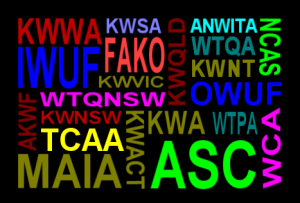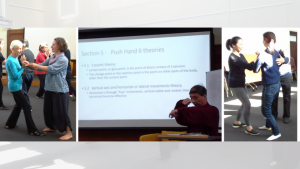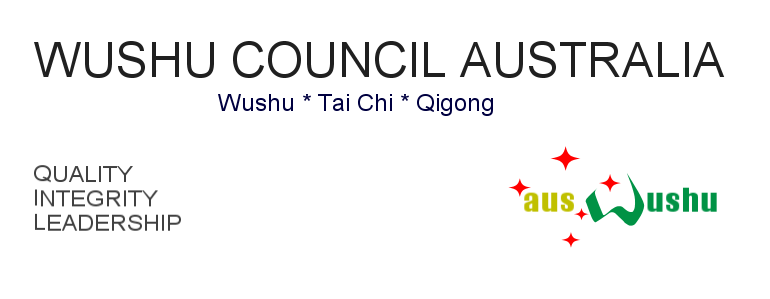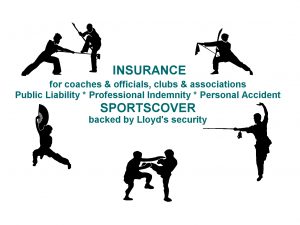 The Tai Chi Association of Australia (TCAA) was founded in 1999 with an aim to establish a strong national independent organisation for all Tai Chi practitioners in Australia. The top priorities, as stated by the first President of TCAA Dr Paul Lam, were sharing knowledge and skills and member benefits in a form of health funds rebates for tuition fees and national database of Tai Chi instructors / classes. Initially, TCAA strongly supported the “Peaceful Challenge” competition which included Tai Chi, Push Hands and Wushu. The competitions attracted many enthusiasts and were a huge success until HIH Insurance collapse in 2001 and following Martial Arts Insurance crisis. The “Peaceful Challenge” organisers could no longer afford the required insurance for the competition and it was folded forever. The TCAA then organised their own competition but, in order to keep insurance premium low, without Wushu and Push Hands. At that time, the TCAA developed strong affiliation with the Australian Kung Fu (Wushu) Federation which was the National Sporting Organisation (NSO) for Wushu and Kung Fu. This was the beginning of converting the TCAA into a submissive envoy to the AKWF recruiting members to boost the AKWF numbers and customers for the AKWF/MAIA insurance. The TCAA Annual Competitions had to be “sanctioned” by the AKWF and all instructors were forced to undertake the NCAS accreditation course. The loss of independence was however met with great excitement which gradually transcended into apathy. As a matter of fact, some TCAA members, especially from good old days, simply believe that they have nothing to do with the AKWF or Kung Fu Wushu Australia.
The Tai Chi Association of Australia (TCAA) was founded in 1999 with an aim to establish a strong national independent organisation for all Tai Chi practitioners in Australia. The top priorities, as stated by the first President of TCAA Dr Paul Lam, were sharing knowledge and skills and member benefits in a form of health funds rebates for tuition fees and national database of Tai Chi instructors / classes. Initially, TCAA strongly supported the “Peaceful Challenge” competition which included Tai Chi, Push Hands and Wushu. The competitions attracted many enthusiasts and were a huge success until HIH Insurance collapse in 2001 and following Martial Arts Insurance crisis. The “Peaceful Challenge” organisers could no longer afford the required insurance for the competition and it was folded forever. The TCAA then organised their own competition but, in order to keep insurance premium low, without Wushu and Push Hands. At that time, the TCAA developed strong affiliation with the Australian Kung Fu (Wushu) Federation which was the National Sporting Organisation (NSO) for Wushu and Kung Fu. This was the beginning of converting the TCAA into a submissive envoy to the AKWF recruiting members to boost the AKWF numbers and customers for the AKWF/MAIA insurance. The TCAA Annual Competitions had to be “sanctioned” by the AKWF and all instructors were forced to undertake the NCAS accreditation course. The loss of independence was however met with great excitement which gradually transcended into apathy. As a matter of fact, some TCAA members, especially from good old days, simply believe that they have nothing to do with the AKWF or Kung Fu Wushu Australia.
In the TCAA Newsletter (November 2016) the current President Mr Ken Goh admits that TCAA should review the reasons for it to exist. Here they are:
- Helping members to get accredited through the Kung Fu Wushu Australia;
- Helping members to buy insurance through the Kung Fu Wushu Australia;
- Helping members to participate in the National and International Competitions sanctioned or organised by the Kung Fu Wushu Australia and the International Wushu Federation;
- Helping members to connect with National Authorities, i.e. the Kung Fu Wushu Australia;
- Helping members to share knowledge and skills (strangely enough, without involvement of the Kung Fu Wushu Australia!)
It is truly amazing that the President believes the TCAA is a member of the “Kung Fu Wushu Australia, renamed from the Australian Kungfu (sic) Wushu Federation” while they are completely different entities. TCAA was indeed a member of the AKWF and probably still is as the AKWF continues its existence (another surprise?!) The constitution of Kung Fu Wushu Australia allows for an association like TCAA to be an Associate Member which:
- will be invited to have a Representative attend all General Meetings;
- does not have the right to vote at any meetings;
- at any General Meeting to which they are invited to attend, has the right for its Representative to be heard on any subject under discussion.
However, if the TCAA President is not aware of the Kung Fu Wushu Australia being a new organisation, it is highly unlikely that the TCAA even applied for its humiliating membership.
Access to National and International Competitions sounds like a great benefit but is it worth losing independence?
The TCAA Championship in 2016 “was approved by the Kung Fu Wushu Australia for selection of Australian Tai Chi national representatives to the IWUF (International Wushu Federation) 2nd World Taijiquan Championships Oct. 14 – 20 in Warsaw, Poland. Three highly accomplished athletes qualified to represent Australia, but regrettably the participation in Warsaw had to be withdrawn as there was no official available to lead the team to the venue.” – TCAA Newsletter (November 2016)
Insurance and accreditation are other important issues that are perceived by the TCAA as fully resolved by affiliation with the Kung Fu Wushu Australia. It is obvious however that the TCAA has no idea to what kind of accreditation they are kindly granted access. The following “tip” from the TCAA newsletters (2016/2017) fully demonstrates this:
“If you have existing insurance, it is unlikely to meet the MAIA accreditation stringent requirements. You are advised to simply say you do not have valid insurance and apply for the MAIA insurance.” – TCAA Newsletter (April 2017)
It is important to understand that MAIA accreditation is officially different from NCAS accreditation. Although MAIA was officially derecognised by the Australian Sports Commission, its accreditation is still sometimes perceived as approved by the government. While the Kung Fu Wushu Australia may still have a valid NCAS involvement inherited from the AKWF, the instructors awarded with that “magic card” supposedly opening all doors ahead should not be seen as “government accredited”. The Australian Sports Commission’s officials, on many occasions, clarified that “the Government does not accredit any instructors. You are an AKWF-accredited instructor”.
The Kung Fu Wushu Australia’s approach to insurance as a requirement for membership / accreditation has been evolving: see their Membership & Insurance Policy. A relatively reasonable requirement to have an insurance for a particular amount in 2010-2012 has been finally developed into an exclusive deal when members MUST buy insurance from a particular insurer. It is not clear what is more amazing: the boldness of the Kung Fu Wushu Australia or spinelessness of the TCAA happy to support such an aggressive practice by encouraging its own members to abandon their freedom of selecting their insurance based on their own interests, not the interests of the “peak body”.
Indeed, not being a governing body, accrediting body or supporting and protecting body for its members poses the difficult existential question for the TCAA. What is its purpose apart from being a loyal voiceless agent supplying unsuspecting members/customers to the national monopoly?
 The Push Hands seminar with Master Ji Shou Xiang from China was held on 10 September in Melbourne. Norman Chong from Universal Tai Chi Academy said: “Participants were very excited about what they learned and experienced about Tai Chi Push Hands! Something they had never learned before. The Six theories of Push Hands are some of the subtle concepts that were introduced for the first time in Australia, probably not very much in China itself. Because this is the result of Master Ji’s more than forty years of research together with his learning from his masters.”
The Push Hands seminar with Master Ji Shou Xiang from China was held on 10 September in Melbourne. Norman Chong from Universal Tai Chi Academy said: “Participants were very excited about what they learned and experienced about Tai Chi Push Hands! Something they had never learned before. The Six theories of Push Hands are some of the subtle concepts that were introduced for the first time in Australia, probably not very much in China itself. Because this is the result of Master Ji’s more than forty years of research together with his learning from his masters.”




